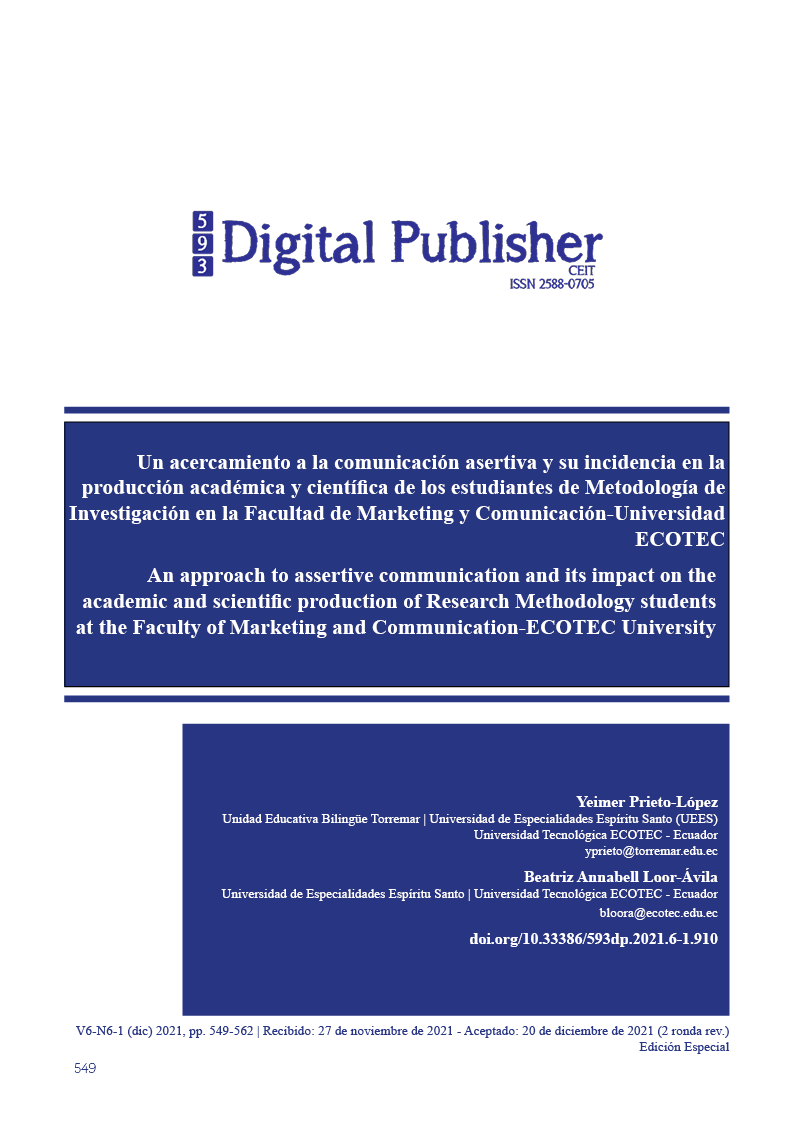An approach to assertive communication and its impact on the academic and scientific production of Research Methodology students at the Faculty of Marketing and Communication-Ecotec University.
Main Article Content
Abstract
An approach to assertive communication and its impact on the scientific production of Research Methodology students at the Faculty of Marketing and Communication-Ecotec Technological University, constitutes a challenge for the teachers who teach the subject of Research Methodology, from experience of researchers for more than fifteen years facilitating the aforementioned subject, both in undergraduate and graduate, allows us to assume that it is important to apply an assertive approach in the relationships established by student-student and teacher-student, in order to stimulate communication from the classroom process.
We outline the main objective of this research: to systematize the assertive communication established between students and its influence on academic and scientific production from Research and Project Design classes. A qualitative-quantitative approach was assumed, neglecting: the theoretical systematization that made it possible to obtain the definitions and concepts of the last five-year period around the selected variables, the historical-logical approach allowed to observe the tendencies of assertive communication and analysis and synthesis, as well as the empirical methods highlighting the criteria of experts to validate the proposal in question and the statistical methods facilitated the qualitative interpretations in the scientific triangulation. As a result, an excellent research design and application was achieved in the first phase of a methodology, which contributed to the scientific production in the different groups selected and that make up the sample chosen intentionally.
Downloads
Article Details

This work is licensed under a Creative Commons Attribution-NonCommercial-ShareAlike 4.0 International License.
1. Derechos de autor
Las obras que se publican en 593 Digital Publisher CEIT están sujetas a los siguientes términos:
1.1. 593 Digital Publisher CEIT, conserva los derechos patrimoniales (copyright) de las obras publicadas, favorece y permite la reutilización de las mismas bajo la licencia Licencia Creative Commons 4.0 de Reconocimiento-NoComercial-CompartirIgual 4.0, por lo cual se pueden copiar, usar, difundir, transmitir y exponer públicamente, siempre que:
1.1.a. Se cite la autoría y fuente original de su publicación (revista, editorial, URL).
1.1.b. No se usen para fines comerciales u onerosos.
1.1.c. Se mencione la existencia y especificaciones de esta licencia de uso.
References
Asanza, N. (24 de 12 de 2019). La Comunicación Asertiva y su Incidencia en la Gestión Educativa. Ciencia y Educación, 1(3), 20-31.
Caridad, M., Cardeño, N., Cardeño, E., & Castellano, M. (2017). Contribuciones de la comunicación asertiva en la resolución de conflictos dentro de instituciones de Educación Superior. Espacios, 38(50), 6.
Castanyer, O. (2013). La Asertividad: Expresión de una Sana Autoestima. Madrid: Desclee de Brouwer.
Castro, E., Mineira, F., & Lovera, M. (2015). Conflicto y Comunicación Informal en las Choque R. y Chirinos, J. (2009). Eficacia del Programa de Habilidades para la Vida en Adolescentes Escolares de Huancavelica, Perú. Revista Electrónica de Salud Pública, 11(2), 169-181.Organizaciones Educativas. Omnio, 21(3), 90.
Chandler, A. D. (2003). Strategy and structure: Chapters in the history of the American
Industrial Enterprise. Cobra, M. (2009). Administração de marketing no Brasil. Brazil.
Contreras, E. (2015). El concepto de Estrategia como fundamento de la planeación estratégica.
Hernández, R., Fernández, C., & Baptista, M. del P. (2014). Metodología de la investigación (6th ed.). McGraw-Hill.
Hernández, R., & Mendoza, C. P. (2018). Metodología de la investigación. Las rutas
cuantitativa, cualitativa y mixta. McGraw Hill Education.
Lesme, A., Barrientos, E., & Cordero, M. (2020). Comunicación Asertiva ¿Estrategia de Competitividad Empresarial? Revista de Investigación, Administración e Ingeniería, 8(1), 147-153.
Medina, R. (2017). La Asertividad como Estilo de Comunicación: ¿Derechos o deberes? Revista Cubana de Tecnología de la Salud, 8(2), 61.
Prieto, M. (2011). Empatía, asertividad y comunicación. Innovación y Experiencias Educativas [revista electrónica], 45.
Rodríguez, C., Figueredo, E., Blanco, V., & Campusano, Y. (2019). El Desarrollo de la Comunicación Asertiva en los Estudiantes de la Carrera Licenciatura en Logopedia de la Universidad de Granma, Cuba. Revista Dilemas Contemporáneas: Educación, Políticas y Valores, 7(1), 21-24.
Sierra Caballero, F. (2020). Introducción a la Teoría de la Comunicación Educativa. España: MAD, S.L.
Ortíz Torres E. Comprensión teórica general de la comunicación. En: Comunicación pedagógica. Libros en Red. 1999[citado 15 jul 2018].
Van der Hofstandt, R. (2005). El libro de las habilidades de comunicación: cómo mejorar la comunicación personal (2ª ed.). Madrid: Díaz de Santos.



